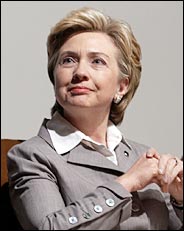October 14, 2004
How efficient are the political futures markets?
So are the political futures markets being manipulated to create the appearance of momentum one way or another? Glenn has a hunch they are. I'm not so sure.
Opinionated Bastard leaves the following comment worth examining:
Looking at the trade sports line, if you look at the bid/ask data, you see some interesting data on the Kerry side. There's a bid for 981 shares at $.43, but the next bid drops to $.39. So the reality is that the market for Kerry shares is probably pretty soft at the current $.43 number since there's only one guy willing to pay that $.43.The trading on the Kerry market is about 1/20th the size of the Bush market so its much easier to skew. That's probably also showing that Bush's chances are even better, because there's less of a point in trading shares you think might become worthless, because the only way to make profit is on market movements.
The Bush market is much tighter, with the big dogs with 1000 share trades are split at $.54 bid and $.57 ask. The Kerry market has the split at $.43 or $.39 vs. $.46.
So my conclusion is that the Kerry market isn't going to be very predictive, but the Bush market being more interesting.
OB is right in that the difference in volume between the markets would make the Kerry contract easier to move than the Bush contract in theory, yet their movements are relatively in tandem. But his point about looking at the trades in the queue is spot on: that spread provides an interesting sense of where the market is as well as the depth of info in a positive and negative direction. In other words, eyeballing the queue for not only the prices but more important the quantity that people are willing to wager is an interesting assessment of relative support. I didn't have my on those columns in the first half hour after the debate, so it would have been interesting to see what type of volume moved the price on the Bush contract lower. An easy way to manipulate would be in effect to execute a contract with yourself which would have the practical impact of lowering or raising the price---you would lose money, but if your goal is moving the price in a particular direction, the monetary loss would be outweighed by the perception gained.
But who would know anything about manipulating futures markets?

Ah, yes.....
All kidding aside, until I see proof to the contrary I'm going to assume that the markets are not being manipulated on a large scale. Why? Because I'm a believer in efficient markets given certain assumptions on how they are controlled. I would be willing to accept that a high profile individual contract like the Bush reelect could be subject to a "push" to create an appearence, but I'm more suspicious when you look at the wider market. Where we can focus on the Tradesports markets on the outcome in each individual state. (I prefer to follow Tradesports because of the higher volume, higher prices, and the markets for the individual states).
As long time readers might remember, we've been discussing the Tradesports electoral college markets since the beginning of the year. These longer pieces from February 8th and 9th lay out the electoral college like this:
State >=$80 The Lead-Pipe Cinches
Utah (5), Virginia [13], Wyoming [3], Oklahoma [7], South Carolina [8], South Dakota [3], Tennessee [11], Texas [34], Alabama [9], Alaska [3], Colorado [9], Georgia 15], Idaho [4], Indiana [11], Kansas [6], Kentucky [8], Louisiana [9], Mississippi [6], Nebraska [5], Nevada [5], North Carolina [15], North Dakota [3], Montana[3] [all carried by Bush in 2000]
Total Electoral Votes in states where the contracts are trading above $80 = 195
$79---$55 The Locks--just don't lose the key
Arizona [10], Arkansas [6], Florida [27], Missouri [11], New Hampshire [4], New Mexico [5], Ohio [20] [all except NM carried by Bush in 2000]
Total Electoral Votes in states where the contracts are trading between $55 and $79 = 83
$54---$44 In playPennsylvania [21], West Virginia [5], Wisconsin [10], Maine [4], Michigan [17]
Total Electoral Votes in states where the contracts are trading between $44 and $54 = 57
So, eight months ago, the markets had Bush trading above $80 in states worth 195 Electoral votes, and between $79 and $55 in states worth 99 EVs for a total of 278.
Eight months and tens of thousands of contract trades later, where does Bush stand?
Using the same criteria, we get these interesting results:
He's trading above $80 in 25 states worth 202 electoral votes. Of the list from February 8th, only Colorado (9) and Nevada (5) have dropped down, but he's added Arizona (10), Arkansas (6), and West Virginia (5).
Bush is trading between $79 and $55 in Colorado (9), Missouri (11), Florida (27), Nevada (5), Ohio (20), and Wisconsin (10), for a total of 82 electoral votes.
Adding the two categories together back on February 8th gave Bush 278 EVs; today, it gives him.....284 EVs. (This is reflected in the Tradesports cumulative electoral votes for Bush contract, which is currently trading at.....$283)
Net result: the Bush/Kerry elected contracts perhaps are subject to manipulation when they are being watched for a high profile move, but the electoral college markets have been steadily efficient so far.
How does this effect strategy? The markets indicate that Bush's chances are really long in Minnesota, New Mexico, Pennsylvania, Oregon, Iowa, and New Hampshire. Of these, the markets give the greatest odds on Iowa ($54.5). Of these states, only New Hampshire went red last time, whereas he's picked up Wisconsin, which went barely blue in 2000. That's a six EV swap in his favor, on top of the 7 EV swing for the red states based on the 2000 Census reapportionment. So, look for the Republicans to put the bulk of their chips on Colorado, Florida, Nevada, Ohio, and Wisconsin, while also spending time in Minnesota, Oregon and perhaps one other wild card blue state (New Jersey?) to force Kerry to defend his blue turf.
The wild cards in the Electoral College are Maine (with its proportional voting) and Colorado, with its ballot initiative for proportional electoral college voting.
UPDATE:
A reader emails with this correction:
Maine does not have proportional voting. It has voting by District. If you get 51% in each district, you win both districts (plus the two at-large electors), for 4 EVs to 0 for the guy who got 49%. It is only if you win one district and lose another that the EVs split. Ditto for Nebraska.
I think Gary is right and I'm wrong---I apologize for the error. If anyone spots anything else, please let me know so I can post a correction.
Posted by Steve at October 14, 2004 10:54 AM | TrackBackMaine does not have proportional voting. It has voting by District. If you get 51% in each district, you win both districts (plus the two at-large electors), for 4 EVs to 0 for the guy who got 49%. It is only if you win one district and lose another that the EVs split. Ditto for Nebraska.
Posted by: Gary and the Samoyeds at October 14, 2004 11:02 AMOne thing: you cannot manipulate one contract without being prepared to manipulate the other, so the relative ease of pushing around the price of the Kerry contract isn't really relevant. The reason for this is arbitrage opportunity.
If Bush trades at a fixed $55 and someone pushes the Kerry contract from $45 to $50, then by selling both contracts you make a risk free $5 (since the winner's contract liquidates at $100 and the loser's at $0). Conversely, if someone crushed the offer on Kerry's contract down to $40, then by buying both Bush & Kerry you again lock in a risk-free $5 profit.
The contracts don't just TEND to move in tandem, they MUST move in tandem. Doubtlessly, there are a few people at tradesports watching for just this sort of arbitrage & making a fair amount in the process. Their arbitrage actions serve to immediately push the contracts back within balance (where the sum of the offers is > $100 and the sum of the bids is
If there were insufficient offers on the Kerry conract, you could create a false data point by buying an out-of-the-money offer, but since the seller could then sell a Bush contract for free profit, there would immediately be a basically unlimited amount of people willing to sell (until all the bids on the much more heavily traded Bush contract had been crushed down).
Is it really worth someone's trouble to blow thousands of dollars just to create a few false data points or false impressions of the market? My answer is no way. Traders and gamblers are notoriously partisan-free when it comes to taking positions.
Posted by: Beck at October 14, 2004 08:18 PM



